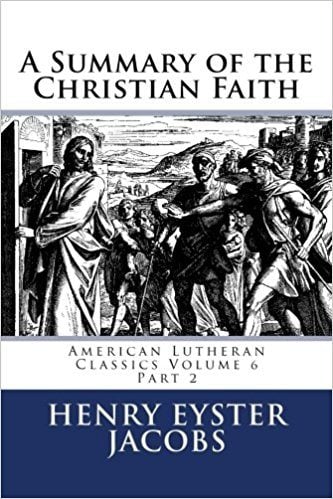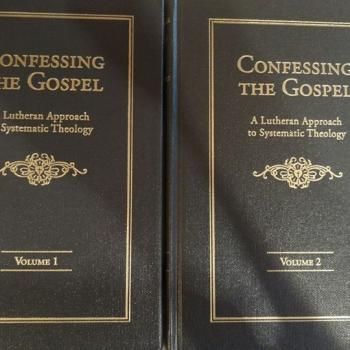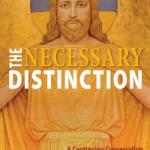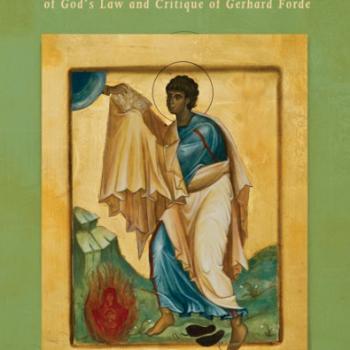Concordia Publishing House recently released a two volume systematic theology titled Confessing the Gospel: A Lutheran Approach to Systematic Theology. This is a much needed set, as there has been a severe lack of Lutheran systematic theological texts in recent years, aside from the Confessional Lutheran Dogmatics series from Luther Academy. I recently received both volumes in the mail, and I have decided to do a series of reviews on these books as I read them section by section. In this first entry, I will examine the overall structure of the text, as well as the Prolegomena.
The volumes themselves are of high quality, hardback texts which are clearly meant to last. It is the intention of these books to be a staple in Lutheran theological education, and I will be curious to see whether these will replace Pieper’s volumes at the Concordia seminaries. I, myself, will have to make such a decision in my Doctrine courses at ALTS, where we currently use Pieper as our dogmatics text, though supplemented by the Confessional Lutheran Dogmatics volumes. Apparently, a new dogmatics series was something that the LCMS had decided to do in 1983, and this work has been in process since that time (before I was even born!). There were around seventy contributors to the project, but each locus has one or two primary authors. One of the most surprising things about the list of authors is the absence of David Scaer, Kurt Marquart, Joel Biermann, Roland Zeigler, and John Stephenson, who are all highly influential Lutheran thinkers that I would have assumed to be some of the primary contributors to a project like this. Many of the major contributors are relatively unknown for other publications. This has simply left me unsure of what to expect as I begin reading.
The setup of the series is unique. Each topic is divided into five sections: Scriptural foundation, confessional witness, systematic formulation, historical and contemporary developments, and implications for life and ministry. The positive element of this structure is that there is a strong emphasis on Biblical theological teaching. In the Scriptural sections, the topic is engaged in relation to the entire Scripture, often citing passages in the Torah, the prophets, the psalms, the Gospels, and epistolary literature. It is refreshing to see that the discussion is not drawn solely from Pauline writings as is the temptation is some Reformation theology, but that it extends throughout Scripture, with a heavy emphasis on the Old Testament. The negative, however, is that because the Biblical and systematic elements are not interspersed, there are some systematic theological elements and debates surrounding various doctrines that simply are not given enough attention due to the prominence of the exegetical element.
Prolegomena
The section on theological prolegomena was written primarily by David A Lumpp who I had not previously been acquainted with. Lumpp is Professor of Theology and Ministry at Concordia University in St. Paul, MN. He is the author of several published articles and a book titled First Things First. [1]
The primary emphasis in the Prolegomena section is the centrality of the gospel for Lutheran theological discourse. Lumpp outlines some essential distinctives of Lutheran thought such as law/gospel, the theology of the cross, and the hidden and revealed God. Lumpp helpfully outlines the relationship of theology to Scripture, the church, and tradition. Scripture is the norm of all theological discourse, but that is not to be divorced from the theologian working within the context of the church. Lumpp emphasizes the importance of Confessional documents within the theological task, as well as listening to the voices of the past when formulating doctrine.
Though a more lengthy discussion may have been of benefit, one of the best aspects of this section is his exposition of the relationship between faith and reason. Lumpp draws on the work of Brian Gerrish who defends Luther from the charges of irrationalism. He argues that what Luther fought against was the “domination of theology by philosophy” rather than reason as such (31). Reason is to be used in the earthly kingdom to discern what is useful and right in the world. He also mentions that there is “regenerate reason,” which is to be used in service of theology (31). This is a reason which serves in humility, submitting itself to the Word of God. It is arrogant reason which Luther opposes, wherein clear teachings of Scripture are overthrown based upon logical assertion. This is identified as the classical distinction between the magisterial and ministerial uses of reason.
While Lumpp’s writing is helpful as far as it goes, there are some notable differences between his approach and that of Pieper and other early twentieth century dogmaticians. This text lacks a discussion of many of the classic ideas explored in Prolegomena in Protestant scholasticism, which I think are extremely important foundational points. He does not explore the archetypal/ectypal theology distinction, nor does he discuss analogical predication in discourse about God. There is no extensive treatment of true and false theology, or natural and revealed theology. Traditional questions about theology as a science are also notably absent here. I also would have preferred to have seen some interaction with various philosophies which guide one’s approach to theology. Lumpp relies primarily on twentieth century Luther scholarship to determine his topics, rather than Gerhard, Quenstedt, and other scholastic thinkers. The writing would benefit from a more consistent use of older authors, rather than simply dealing with twentieth century thinkers.[2]
The second major concern I have with this Prolegomena is the use of the phrase “law/gospel polarity” throughout the text (3). It is certainly an odd choice of words, and one which I hardly ever see used in a positive light. Joel Biermann has used the phrase “law/gospel polarity” to refer to a mistaken notion of the Lutheran distinctive which approaches them as contradictory words of God. The law and the gospel are distinct, but they are not to be polarized against one another. Such a contention has immense theological problems. It may perhaps simply be the case of unfortunate wording on Lumpp’s part rather than an actual theological issue at this point. However, due to so many common misconceptions surrounding Lutheran thought on the law-gospel distinction, wording in this area should be as precise as possible.
Conclusion
Thus far, I have found both positive and negative elements to this treatment in its introductory section. The Biblical and exegetical element is to be appreciated, as it thoroughly grounds doctrine upon the entirety of Scriptural revelation, rather than solely through the Pauline writings. The Prolegomena helpfully emphasizes the centrality of the gospel in Lutheran theology, as well as its churchly character. Lumpp also helpfully defines the connection between faith and reason, and interacts with contemporary scholarship on a number of points. However, the doctrinal precision of the older scholastic texts is missing here, which is an unfortunate departure from other dogmatic treatments.
[1] I corrected my original post which said that he had not authored any books. I was mistaken.
[2] As I’ve read these volumes, I have seen many more references to Gerhard Ebeling and Helmut Thielecke, than I have to figures like Abraham Calov and David Hollaz. While I certainly think its important to deal with developments in Lutheran theology from outside of the strict confines of Confessionalism, I find it unfortunate that seventeenth century thinkers are not given more attention, especially as they were so important for Pieper and other early LCMS thinkers.












